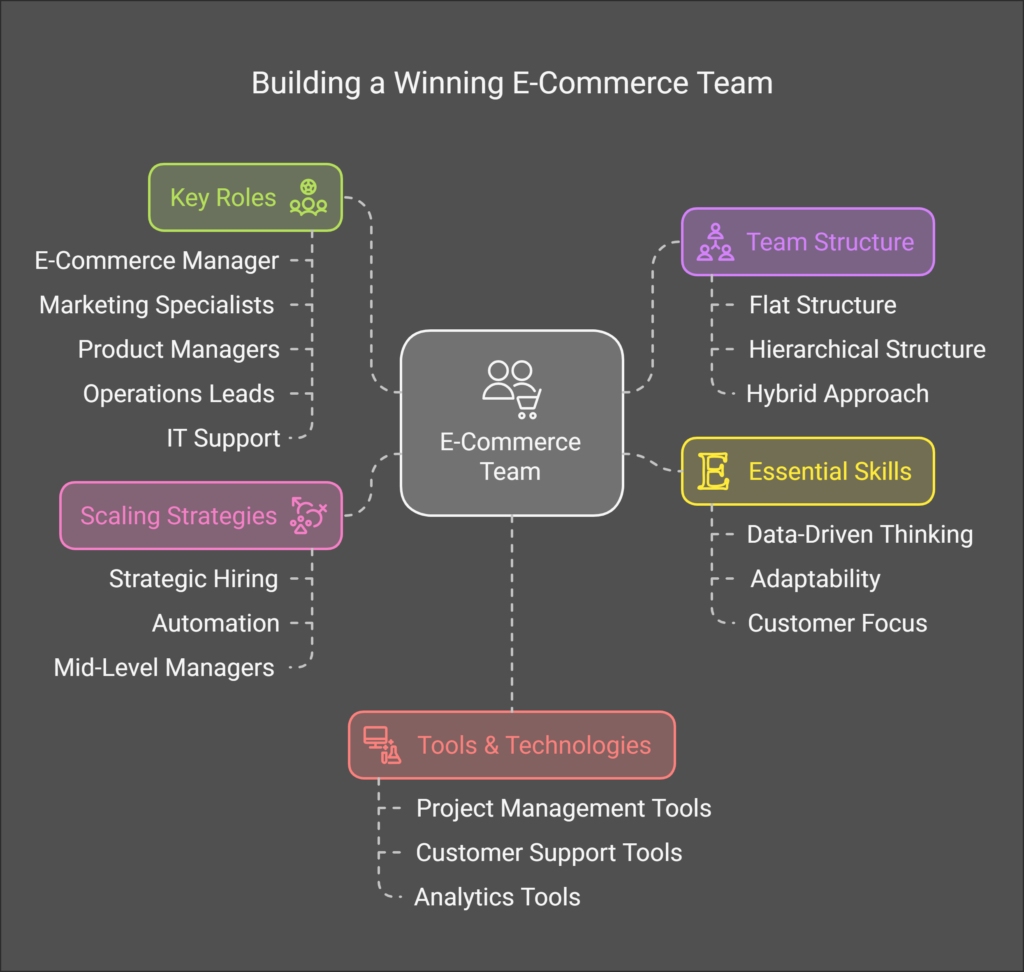A Step-by-Step Guide to Creating an Effective E-Commerce Team for Your Online Business
Introduction: Why Your E-Commerce Team Matters
Picture your e-commerce team as the gears of a clock. When each piece works seamlessly, your business runs like clockwork. But if one piece breaks or doesn’t fit, everything can grind to a halt.
An effective e-commerce team drives sales and runs operations. It ensures your business thrives in a competitive market. This article will help you. It will help you find key roles, structure your team for success, and give them the right tools to scale your business.
1. Key Roles in an E-Commerce Team
“Who’s on Your Dream Team?”
Every successful e-commerce business relies on experts. They make sure operations run smoothly, boost sales, and keep customers satisfied. Here’s who you need:
E-Commerce Manager: The captain of the ship. They set the strategy, KPIs, and align the team with business goals.
Marketing Specialists: They are your growth champions. They manage SEO, social media, email campaigns, and paid ads to drive traffic and convert leads.
Product Managers: They select products, set prices, and manage categories.
Operations Leads: Oversee inventory and logistics. Ensure supply chains are efficient and reliable.
IT Support: These experts keep your website and tools running smoothly.
Tip 1: Use tailored job descriptions. They will attract multi-skilled pros who can adapt to a fast-changing environment.
Tip 2: Check out the E-Commerce Profit Calculator Sheet. This free tool helps your Ops Leads manage costs and boost profits.
2. Building the Best E-Commerce Team Structure
“Flat or Hierarchical: What’s the Best Setup?”
Your structure affects your team’s teamwork and strategy execution. Here are two common approaches:
Flat Structure: Ideal for startups and small teams. It cuts bureaucracy. This boosts collaboration and speeds up decision-making.
Use a hierarchy. It’s best for larger, growing businesses. Clear chains of command ensure accountability. They help avoid role overlap.
A hybrid approach works best for growing e-commerce businesses. It blends flat collaboration with hierarchical accountability.
Tip 1: Use org chart templates or team management tools. They can help you spot bottlenecks in your team structure early.
Tip 2: Read here about 7 Fatal E-Commerce Mistakes. It shows what to avoid in E-Commerce for long-term success.
3. Essential Skills for E-Commerce Team Members
“What Makes a E-Commerce Team Member an A-player?”
It’s not just about hiring experienced pros. It’s about finding people with the right skills and attitudes to excel in e-commerce’s fast-paced world. Key traits include:
Data-Driven Thinking: Analytics is key in decision-making. Seek candidates who know KPIs, like CAC and conversion rates.
Adaptability: E-commerce evolves quickly. Team members must be comfortable learning new tools, platforms, and trends.
Customer Focus: We must prioritize the customer journey. It means making great product pages and providing excellent support.
Tip: In interviews, ask for examples of adapting to new tech or achieving success.



